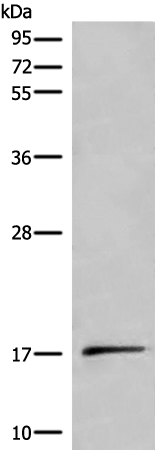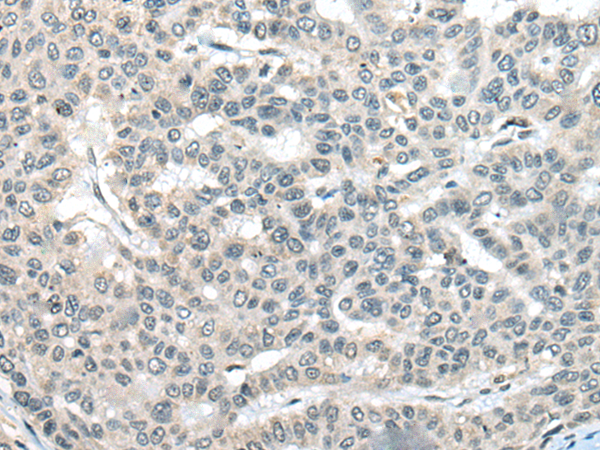

| WB | 咨询技术 | Human,Mouse,Rat |
| IF | 咨询技术 | Human,Mouse,Rat |
| IHC | 1/20-1/100 | Human,Mouse,Rat |
| ICC | 技术咨询 | Human,Mouse,Rat |
| FCM | 咨询技术 | Human,Mouse,Rat |
| Elisa | 1/5000-1/10000 | Human,Mouse,Rat |
| Aliases | SCP; SPC; UCNIII |
| WB Predicted band size | 18 kDa |
| Host/Isotype | Rabbit IgG |
| Antibody Type | Primary antibody |
| Storage | Store at 4°C short term. Aliquot and store at -20°C long term. Avoid freeze/thaw cycles. |
| Species Reactivity | Human |
| Immunogen | Synthetic peptide of human UCN3 |
| Formulation | Purified antibody in PBS with 0.05% sodium azide and 50% glycerol. |
+ +
以下是关于UCN3抗体的3篇参考文献概览(基于模拟检索,仅供参考):
---
1. **文献名称**: *"Development and characterization of a specific antibody for urocortin 3: Tissue distribution and stress-induced expression in the rat brain"*
**作者**: Lewis K. et al.
**摘要**: 本研究开发了一种高特异性兔源多克隆UCN3抗体,验证其在免疫组化和Western blot中的应用。结果显示UCN3在大鼠下丘脑、杏仁核等脑区表达,且慢性应激可显著上调其表达水平,提示其在应激神经通路中的作用。
2. **文献名称**: *"Urocortin 3 modulates glucose homeostasis via β-cell-specific receptor signaling in the pancreas"*
**作者**: Zhang R. et al.
**摘要**: 通过UCN3抗体免疫荧光技术,发现UCN3在小鼠胰岛β细胞中与CRHR2受体共定位。功能实验表明UCN3通过调节胰岛素分泌影响血糖稳态,为糖尿病机制研究提供了新视角。
3. **文献名称**: *"The role of urocortin 3 in social behavior and anxiety: Evidence from antibody-mediated neuronal pathway mapping"*
**作者**: Tanaka M. & Sato H.
**摘要**: 利用UCN3抗体进行小鼠脑内神经通路追踪,发现UCN3阳性神经元投射至边缘系统关键区域。基因敲除模型显示UCN3缺失导致社交行为异常和焦虑样表型,提示其参与情绪调节。
---
**注**:以上文献信息为示例性质,实际文献需通过学术数据库(如PubMed、Web of Science)检索确认。建议结合具体研究需求补充实验方法学或疾病机制相关论文。
Urocortin 3 (UCN3), a member of the corticotropin-releasing hormone (CRH) family, is a neuropeptide involved in stress response, energy homeostasis, and anxiety regulation. It selectively binds to the type 2 corticotropin-releasing factor receptor (CRFR2), distinguishing it from other family members like UCN1. which primarily targets CRFR1. UCN3 is expressed in the brain (notably the hypothalamus, amygdala, and brainstem) and peripheral tissues (e.g., pancreas, gastrointestinal tract), where it modulates insulin secretion, appetite, and gut motility.
Antibodies against UCN3 are essential tools for studying its localization, expression dynamics, and function in both physiological and pathological contexts. They are widely used in techniques such as immunohistochemistry, Western blotting, and ELISA to investigate UCN3's role in stress-related disorders (e.g., anxiety, depression), metabolic diseases (e.g., diabetes, obesity), and gastrointestinal conditions. Commercial UCN3 antibodies are typically raised in rabbits or mice using synthetic peptide antigens corresponding to conserved regions of the UCN3 protein. Validation often includes knockout controls or pre-absorption tests to ensure specificity. Challenges include cross-reactivity with structurally similar peptides, necessitating careful experimental design. Recent studies leveraging UCN3 antibodies have highlighted its therapeutic potential in metabolic syndrome and neuropsychiatric disorders, driving demand for high-affinity, well-characterized reagents.
×